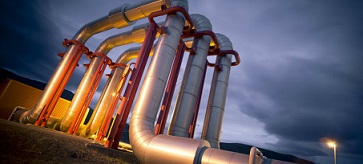Poland and Denmark to launch key gas pipeline survey

Photo Source: Warsaw Point
Warsaw/Copehagen (Reuters)—Poland and Denmark will launch a key survey to determine demand for capacity in a planned gas pipeline linking the two countries, a project that could allow Poland to import up to 10 Bm3 of gas from Norway.
Poland imports most of the 15 Bm3y–16 Bm3y of gas it consumes from Russia and hopes deliveries from Norway, as well as by sea through its LNG terminal on the Baltic coast, will reduce that reliance.
The so-called Open Season procedure to be launched by the Polish and Danish gas system operators is a market survey that will help confirm the extent of gas demand and the required capacity for the Baltic Pipe.
"The preliminary study shows that the project could bring economic benefits for both Poland and Denmark, improved security of gas supply and further diversification of energy sources in the EU," said Danish Climate and Energy Minister Lars Christian Lilleholt.
However, he said that uncertainty around the economics of the project remains, and the results of the market survey would be important for the final investment decision.
"The government will have to make a decision on more binding phases of the project. It will be crucial to confirm that the project will bring significant economic gains for Denmark and does not entail unnecessary risks," he said.
Poland's state-run gas firm PGNiG, which buys most of its gas from Russia's Gazprom, has said that it would book almost all of the capacity offered. PGNiG plans to replace Russian supplies with gas deliveries from Norway and LNG after 2022, when its long-term deal with Gazprom expires.
Danish gas system operator Energinet.dk said that its goal was to start gas transmission services by October 2022.
Poland's ruling conservative Law and Justice party (PiS) revived the plan for the pipeline, which dates back to 2001, in 2015 and confirmed that it was a top priority. Since then, it has struggled to convince Norway and Denmark to join in and negotiations have been tough, mostly on how to split the costs—information that has not been disclosed.
(Reporting by Agnieszka Barteczko and Stine Jacobsen; editing by David Clarke)

- RWE strengthens partnerships with ADNOC and Masdar to enhance energy security in Germany and Europe
- TotalEnergies and Mozambique announce the full restart of the $20-B Mozambique LNG project
- Venture Global wins LNG arbitration case brought by Spain's Repsol
- Mitsubishi Heavy Industries Compressor acquires Swiss rotating equipment maintenance company AST Turbo AG
- KBR awarded FEED for Coastal Bend LNG project



Comments